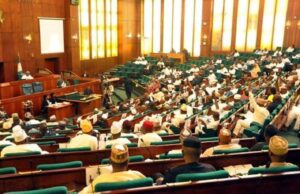
The House of Representatives has today, faulted terms of the loan agreement between the Federal Government and China, describing it as dangerous.
It said that despite the fact that the Federal Government signed an Executive Order providing guidelines on waiver of sovereign immunity during loan and commercial agreement negotiations in 2014, it had been violating the order.
Chairman of the House Committee on Treaties, Protocols and Agreements, Nicholas Ossai, while speaking at the investigative hearing on external loans and commercial agreements, said the loan agreement was being made using Chinese laws and not Nigerian laws.
Appearing before the committee were the Minister of Transportation, Rotimi Amaechi; Minister of Works and Housing, Babatunde Fashola; Minister of Communications and Digital Economy, Ali Pantami; Minister of Police Affairs, Muhammad Maigari; and Minister of the Federal Capital Territory, Mohammed Bello.
Others included the Director-General, Debt Management Office, Patience Oniha; Permanent Secretary (Special Duties in the Ministry of Finance), Aliyu Ahmed and Director, Legal Services, Gabriel Christopher, both representing the Ministry of Finance, Budget and National Planning.
READ ALSO: Create your country, live by your own laws, Presidency tells Oyedepo
Ossai said the government officials charged with securing the loans were desperate to get it for their own selfish interests, and we’re unwilling to perform a thorough getting of its merits for national interest.
He said, “We will like Nigerians to know that we are not focusing on only Chinese loans. From what we know, Nigeria has over 500 bilateral loan/commercial contract agreements and investment treaties with different countries and institutions. There is no way the committee will do a thorough job without segmenting the issues based on countries, institutions or MDAs.
“The loan agreements we have seen so far show that government officials charged with the responsibility of representing Nigeria in these issues are more desperate to just take the loans at any condition, possibly using non-negotiated loan agreement templates rather than go through the rigour of diligent technical review of negotiating specific clauses with clarity and for national interest.”
He also criticised the sovereignty waiver clause in the contracts, dubbing it ambiguous, obscure and against normal practice.
He said, “Even in situations where countries, out of desperation and weak economic position, waive their national sovereignty in bilateral or contractual agreements, the immunity of sovereignty waiver clause will usually be clear and categorically state specific assets associated with the loans for takeover in the event of default.
“However, the immunity clauses in most of these agreements before us are not only ambiguous, but also very obscure and without recourse to the fact that the Nigerian government had issued a circular on the subject matter with Reference Number SGF/OP/1/S.3/X/1739, dated 11th August, 2014, which is an Executive Order, that provides guidelines on issues of waiver of sovereign immunity clause during loan and commercial agreement negotiations.”
He also accused the executive of signing blank documents. According to him, “This approach is the reason we have government representatives signing empty pages of loan agreement repayment schedule and other key documents required for the loan agreements to become effective.
“We have commercial contracts signed in US dollars, while the loan agreements for the execution of the same contracts were signed in Chinese Yuan currency in the Ministry of Communications and Digital Economy/Galaxy Backbone Limited.”





